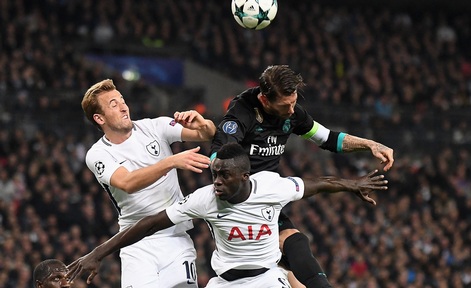Is football a killer? Doctor says headers aren't worth the high dementia risk
Is football a killer? Is heading absolutely necessary to play football if it puts you at greater risk of dying of dementia? Dr Willie Stewart says in the podcast Let’s Talk About Care that dementia in football is an industrial disease and players must be protected from it.
After studying the donated brains of footballers, including that of England’s 1966 World Cup winner Nobby Stiles, the traumatic brain injury expert says in the podcast: “death from degenerative brain disease is much higher in professional footballers than it should be” and believes footballs should be sold with a health warning about heading.
Global rules of football must change
His research found professional footballers have a five times higher risk of developing Alzheimer’s than the general public due to head impacts. He is now calling for the global rules of football to change and has given football bodies and other contact sports a wake-up call. "Is heading a ball absolutely necessary for football? Is dementia absolutely necessary as a risk to play football? I don't think it is."
The consultant neuropathologist at the Queen Elizabeth University Hospital in Glasgow, was commissioned by the Football Association in 2017 to research brain injury among footballers. His FIELD (Football’s Influence on Lifelong health and Dementia risk) study found the risk of dementia is highest among defenders, who are five times more likely to have dementia than non-footballers.
Footballers who are forwards have a three times higher risk than non-players and goalkeepers have almost no increased risk at all, when compared with the general public.
The study analysed health records for 7,676 Scottish, male ex-professional footballers (born between 1900-1976) and matched them against 23,000 men from the general population.
Header guidelines based on ‘sham science’
Head impacts are caused by heading the ball and collisions with other players.
Dr Stewart says dementia in football should be recognised as an industrial disease but “for some reason sport, we seem to get a blind spot on this. If your trade is playing football you should get the same protections as shipbuilders, policemen, whoever.”
Describing in the podcast about the impact of just 20 headers on the brain, his comments follow English football’s introduction of guidelines with recommended heading limits for all professional and amateur players in training.

Professional players now will be limited to 10 'higher-force' headers in training from long passes, corners or free-kicks and amateur players are limited to 10 headers per week. The FA based their recommendations on analysis of matches and estimated what the forces might be.
However, Dr Stewart has said the heading guidelines are based on “sham science” that no one is even required to follow.
"It’s a sham science" based on a computer algorithm to work out how many headers there were and what forces there were.
"They didn’t actually measure any heading forces nor did they measure any brain function before, during or after match. They didn’t look at training.”
He argues "so-called" low force and high force headers limits may not reduce a player’s risk of dementia.
“By saying players can be exposed to x high force headers a week, for all we know they were never exposed to that many…they were exposed to 200 low force headers.
“By making these changes, what they’re essentially saying is that heading is essential to the game of football. They are not willing to countenance the idea that we could have football…without heading.”
Five members of England’s World Cup-winning group, Ray Wilson, Martin Peters, Nobby Stiles, Alf Ramsey and Jack Charlton developed dementia and died. Last month, the first football game for adults played with heading restrictions was played in a charity match in County Durham. Headers were allowed in the penalty box in the first half, before being completely banned in the second half.
Ex-Leeds midfielder John Stiles, whose 1966 World Cup-winning father Nobby Stiles died in October 2020 of dementia, said: “What I want to see is heading drastically reduced in training. I just don’t think it’s necessary.”
No dementia cure in his lifetime
After studying footballers’ brains, Dr Stewart does not think a cure for dementia will be found during his lifetime.
“Seeing brains of people who have had dementia and seeing the damage it does, it’s really hard for me to understand how we can come up with any treatment which would cure that.. reverse it, return the brain to something resembling normal ageing.”
However, he says we may “slow down the progression of the disease”.
Dr Stewart is urging the public to consider donating their brains after death (those with and without dementia) to further research by contacting the The Glasgow Brain Injury Research Group (GBIRG).
“The gift of being able to understand, by looking at the tissue by looking down a microscope…we wouldn’t be talking now about the particular risk of dementia in football and it’s association with head impacts…had it not been for our studies.”
On 22 July 2021, the Department for Digital, Culture, Media & Sport select committee’s report into concussion in sport concluded not enough is being done to protect sportspeople from the risk of brain injury.
“What is astounding is that when it comes to reducing the risks of brain injury, sport has been allowed to mark its own homework”, said the committee chair, Julian Knight MP.
“The Health and Safety Executive is responsible by law, however risk management appears to have been delegated to the national governing bodies, such as the FA. “That is a dereliction of duty which must change."
Dr Stewart: Prevention better than paying footballers’ care home fees

Trade union the Professional Footballers' Association has said it wants an industry-wide fund established to finance players’ care home fees, and called on the Football Association, the Premier League and others to pay for it.
Dr Stewart welcomes the idea of the professional players’ care home fees being paid for but said the step is “defeatist” as tackling preventative measures such as assessing brain health for current players and former footballers below the age of 60-years-old should be a priority.
He believes the global rules of the game must change to address the “phenomenally high” dementia risk amongst players and football games to be played without headers to see if it made a difference.
“This is a global game. It’s the biggest participation sport in the world. This is a global problem. Where’s FIFA?”
English football could alone decide to introduce ‘concussion substitutions’ to substitute a player during the game to be able to remove the player with a suspected head injury and assess them properly but “unfortunately the global laws of the game won’t allow that.”
Dr Stewart has suggested football authorities like FIFA adopt a similar approach to rugby with different formats of the game introduced such as football with no heading.
“This is an entirely preventable risk of dementia. The rules of rugby change almost season to season.
“If football were to take a more pragmatic view to this and decide that actually the risk of dementia wasn’t necessary for the game of football, heading should be reduced or even eliminated, I think there would be a season where they would go ‘oh the game has been ruined’ and then once they got back to watching their teams win…it will be forgotten about.”
He says “just as we think it would be bizarre to drive around in a car without a seatbelt on, we will look back and think how on earth did we think it was smart smacking a ball off someone’s head repeatedly over and over again?”
In response to Dr Stewart’s findings, a FIFA spokesperson said: “The said study helps with our understanding of how playing football potentially affects the brain as it indicates that factors associated with non-goalkeeper positions should be scrutinized that may help mitigate risks. In the meantime, FIFA will continue to support further research and to explore strategies to further protect players’ health, reduce risks and mitigate negative outcomes in this population.”
To hear Dr Stewart describing the dangers of football, check out Episode 22 of Let's Talk About Care podcast on Spotify, Apple or by clicking here.
Latest News
 29-Jul-24
Dementia Bus gives carehome.co.uk staff insight into life with dementia
29-Jul-24
Dementia Bus gives carehome.co.uk staff insight into life with dementia
 27-Jul-23
UK's top home care agencies in 2023 revealed
27-Jul-23
UK's top home care agencies in 2023 revealed
 30-Nov-22
A quarter of older people keep their falls secret from family
30-Nov-22
A quarter of older people keep their falls secret from family
 29-Nov-22
'Covid-19 has not gone away' say terminally ill
29-Nov-22
'Covid-19 has not gone away' say terminally ill
 28-Nov-22
IT consultant who received poor care opens 'compassionate' home care business
28-Nov-22
IT consultant who received poor care opens 'compassionate' home care business